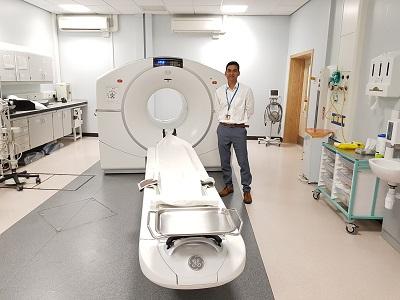
Tayside patients are benefitting from a new innovative scanning service which aims to identify cancer spread at an earlier stage.
The new advanced Gallium Positron Emission Tomography with Computerised Tomography (PET/CT) scanning technology is funded by the Scottish Government and supports clinicians to detect abnormalities in the body. The Tayside Gallium PET/CT service is initially being rolled out for patients with neuroendocrine cancers and in the coming months this service will be extended to patients with prostate cancer.
Patients in Tayside are some of the first in Scotland to experience this new type of scan and some have already had a Gallium PET/CT scan at Ninewells Hospital as part of their cancer treatment plan.
Gallium PET/CT is a highly specialised form of PET/CT scan which allows for a much more accurate diagnosis of possible cancer relapse, helping to identify areas where cancers have spread to other parts of the body after initial cancer treatment. Having this more detailed information enables clinicians to identify where any recurrent tumours are located, allowing for appropriate treatment and to make any changes to a patient’s treatment plan if necessary.
This new service is led by NHS Tayside’s consultant radiologist Dr Prasad Guntur who explained,
“The Gallium PET/CT service is a crucial new addition to the existing Tayside PET/CT service which has helped in the management of thousands of patients since its introduction in 2010, predominantly in cancer patients.
“Following a diagnosis of cancer, treatment plans are made according to the stage of the disease in each patient. Accurate disease staging is vital and requires the use of PET/CT scans and this is where the advanced images produced by a Gallium PET/CT can benefit cancer patients.
“Prostate cancer is the most common cancer in males in UK and this new addition to our scanning services will be hugely helpful in their management pathways.
“This new scanning method will allow clinicians to get quick and accurate information about whether advanced prostate cancer has spread to another part of the body. Importantly being able to carry out Gallium PET/CT scans in Tayside means that patients do not need to travel outwith the region any more for other specialist scans and they now have access to even better and more tailored investigations if appropriate.”